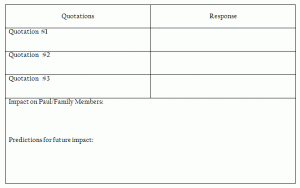In Tangerine, we are exposed to the dynamics of the Fisher family. Early on, we see that the relationship between Paul and his family is strained at best.
Lat night, I read the following article: http://www.sciencecodex.com/differential_parenting_found_to_affect_whole_family-106682 about the effects of differential parenting. As your teacher, being able to tie-in real world experiences and research to fiction is always exciting because you’re able to see how your learning goes beyond the classroom.
1. Read the article. If you want to print this out and put this in your 7C tab, please do.
2. In your IRN, create a dialectical journal organizer (with a twist) — See below
3. Use the left hand column to record at least three quotations that affected you. Be sure to properly quote and punctuate.
4. Use the right hand column to record your thoughts, reactions, and connections to the novel (i. e., Paul, Erik). In the bottom rectangle, write down the impact on Paul and other family member so far (based on your understanding of the article) and your predictions about any future impact (Part 3).
5. Be prepared to share-aloud on Wednesday.

